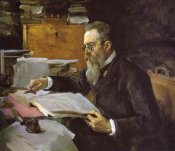Characters
Salieri, bass
Mozart, tenor
Synopsis
Scene One
Salieri describes his struggle “through unremitting, concentrated effort” to achieve a high position in art, upon which Fame smiled.
And did I envy then my colleague’s works,
Their triumphs in that wondrous art? No, never!
When Piccini charmed the Paris mob,
When I first heard the opening of Gluck’s
Great Iphigenia, could any man
Have called the proud Salieri envious . . .
No, none! But now — it’s I who say it — now
I’m envious. I feel the most profound,
Tormenting envy. God in Heaven! Where
Is justice, when the sacred gift, undying
Genius, is granted not for labour,
Not for burning love, self-sacrifice,
Devotion, prayer — but illuminates
A madman’s head, an idle waster? Mozart!
Mozart!
Salieri invites Mozart to supper where he will poison him.
What is the point, if Mozart should live on,
And rise to even more exalted heights?
Will he then elevate our art? No, no —
When once he disappears, it will decline
Again, since he will leave no heirs. . .
Scene Two
Mozart and Salieri dine at a private room in an inn. Mozart appears depressed. He explains that his Requiem is troubling him, a work commissioned by a strange man in black. Mozart even imagines his presence at their table. Salieri quotes Beaumarchais:
’Friend Salieri, listen — if a dark
Mood should descend on you, then just uncork
A bottle of champagne, or else re-read
My Figaro
Mozart observes that Salieri and Beaumarchais were good friends. He then asks, “But is it true that . . . Beaumarchais once poisoned someone?”
I mean, the man’s a genius,
As are you and I. And surely genius
And villainy are incompatible?
Salieri pours the poison into Mozart’s glass. They toast and Mozart drinks. Mozart goes to the piano and begins to play. He sees Salieri weeping. Salieri encourages him to play on. But Mozart feels unwell and leaves. Salieri bids au revoir.
You’ll sleep for long
Enough now, Mozart! What if he is right,
Though, and I’m not a genius? Genius
And villainy are incompatible?
Not true — just think of Michelangelo;
Or is that just a fable by the stupid,
Mindless mob? And wasn’t the designer
Of the Vatican a vile assassin?
[All quotations from Alexander Pushkin, Boris Godunov — The Little Tragedies, trans. Stephen Mulrine (London: Oberon Books, 2002)]
